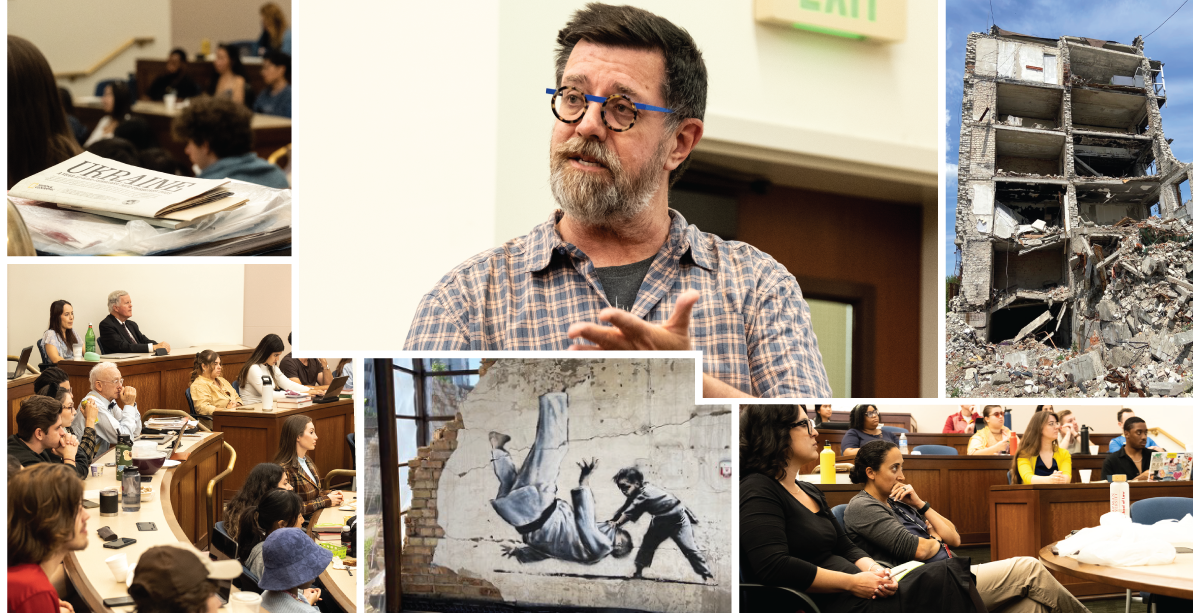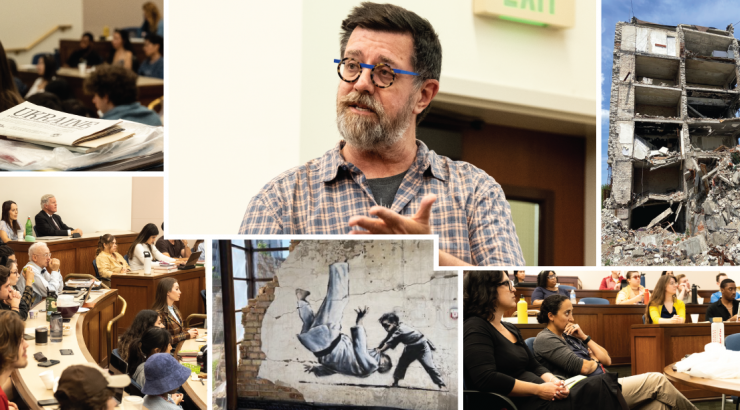It’s All About the Culture, Stupid! Destroying Ukrainian Culture is the Purpose of Everything the Russians are Doing in Ukraine
February 26, 2024

I spent two months in Kharkiv this summer documenting the widespread campaign of destruction unleashed by Russia against Ukrainian museums, libraries, theaters, art galleries, local cultural centers, and other important cultural sites. The scale is almost unimaginable, the human and heritage cost incalculable. Yet this aspect of the war is mainly understood in the West as some sort of collateral damage to the military campaign, tangential to the Russian war aims, regrettable but somehow inevitable in modern conflict.
This is fundamentally wrong. This war is primarily about the attempted eradication – and the desperate defense of – an independent cultural identity. If Putin succeeds, Ukraine will be erased, suppressed, scattered, and absorbed. Ukrainian culture will be silenced, coopted, subjugated, stolen. Nothing about this is collateral or tangential or accidental. It’s what the war is about. Cultural erasure is not some obscure aspect of the war: it is the central pillar of the entire Russian undertaking.
The President and First Lady of Ukraine have attempted to draw our attention to this. Olena Zelenska in particular has taken this cause to the international community. She has argued that the destruction of “our historical and cultural heritage is one of the strategic goals for the aggressor country.” After the bombing of the Palace of Culture in Lozova in Kharkiv, her husband stated: “The occupiers have identified culture, education and humanity as their enemies.”
Ukrainians are all too aware of Russia’s end-goal. Marjana Varchuk, Curator at the Bohdan and Varvara Khanenko Museum of Art in Kyiv, is unequivocal about Russia’s war aims: “Destroying our culture is the purpose of everything the Russians are doing. Culture and language strengthen our nation, they remind us of our history. That’s why the Russians are shelling our monuments, our museums, and our history. That’s what they’re fighting with.”
Putin is nothing if not clear about his intentions. He has called Ukrainian statehood “a fiction,” and alleged that Ukraine only exists because of a series of mistakes by Soviet leaders. He claims that Ukrainians lack the history, identity, and culture worthy of a separate state. His pundits have claimed that Ukrainian language and culture simply do not exist. Russian historians and scholars tamely support the Kremlin’s line. Reality is bent to meet Putin’s warped narrative.
The current campaign aimed at degrading Ukrainian culture has been unrelenting. As of mid-September, UNESCO has verified the damage and destruction of 289 sites of significant Ukrainian cultural heritage since the invasion began in 2022. These include over one hundred religious sites, almost thirty museums, over 100 buildings of historical and/or artistic interest, and assorted monuments, libraries, and archives. Included are some of the country’s most iconic and irreplaceable buildings and historical collections. This is necessarily a conservative (though growing) estimate, as confirming events in areas controlled by the Russians, or in current conflict zones, is almost impossible. Ukraine’s Ministry of Culture puts the figure much higher. Evidence of intentional targeting is clear.
The Donetsk Academic Regional Drama Theater, in the city of Mariupol, in Donetsk Oblast, was destroyed by a bomb dropped by a Russian aircraft. At least 600 civilians were killed who had been sheltering there. The building was clearly marked “children.” A museum in Ivankiv dedicated to the beloved folk artist Maria Prymachenko was partially burned down. A Russian missile erased the history museum in Kupiansk in the Kharkiv Oblast.
There is perhaps one attack that stands out, both because of the symbolic nature of the site, and because it was so obviously intentionally targeted. In May 2022, a Russian missile destroyed the museum and historic home of Ukraine’s greatest poet and philosopher, Hryhoriy Skovoroda. Located in a peaceful forest near the tiny village of Skovorodynivka in the Kharkiv Oblast countryside (think Walden Pond and Thoreau), his home and grave were visited by generations of schoolchildren. His portrait is even to be found in most Ukrainian pockets, adorning current banknotes. The burned ruins of his home now stand as evidence – if any were needed – that even the most remote and isolated historical sites, if cherished by Ukrainians as a symbol of national identity, are at risk of sudden, unannounced and devastating attack. The governor of Kharkiv, Oleh Synyehubov, responded: “The occupiers can destroy the museum where Hryhoriy Skovoroda worked for the last years of his life and where he was buried. But they will not destroy our memory and our values.”
In those regions occupied even temporarily by Russian forces, the destruction, looting, and vandalism of art and cultural artifacts has been rapid, systematic and well-organized. It has taken place at a speed, thoroughness, and scale not seen in Europe since the Nazis or the Soviets during World War Two. What valuable art has not been burned or blown to pieces, has been carried off. Russian occupiers helped themselves to a unique collection of coins and medals from a local museum in Mariupol. They looted the Kuindzhi Art Museum, named after Arkhip Kuindzhi, a famous Mariupol-born landscape painter. A unique collection of ancient gold artifacts was stolen from the city of Melitopol. The list goes on. Reports indicate that stolen items have already turned up in Moscow and on the black market. Libraries have been stripped of Ukrainian language books, while books on Ukrainian history, poetry and literature have been replaced by texts approved by Moscow extolling Russian culture and history.
The Zelinskys are exactly correct. Their nation faces an existential threat from a Russian invasion intended to target and delete Ukrainian cultural identity. Putin’s intentions are there for everyone to see. Russia will blot out Ukraine as an independent culture, a people, and an idea. Only ruins will be left, the remnants and memory of culture scattered to the wind or buried in rubble.
There is, of course, an internationally recognized term for the crime where acts are committed with the intent to destroy, in whole or in part, a national, ethnic, racial or religious group: genocide. It is a term which brings with it clear duties and responsibilities. We cannot become bystanders to the events in Ukraine, as much as some might wish that, and even if that would be the cheaper or more convenient political path. We owe a moral, ethical and legal duty to ensure that Putin’s goal of the erasure of the Ukrainian cultural identity does not succeed.
Dr John A. Hall
Professor of Law
Fowler School of Law


